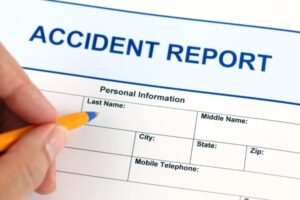Defining a Hit-and-Run Accident
A hit-and-run is when a driver leaves the scene of a crash without stopping to share their contact or insurance details with the other person involved. This could involve anything from scraping a parked car to causing major vehicle damage or bodily injury.
Law enforcement agencies treat hit-and-runs harshly because they endanger public safety. Penalties vary depending on the severity of the incident. Minor property damage might lead to a misdemeanor charge. However, cases involving injuries or a stolen car can escalate to felony charges.
Understand the difference between misdemeanor and felony hit-and-runs. If the crash occurred and resulted in only minimal damage, the consequences may be less severe. However, if the incident involves uninsured drivers, significant vehicle damage, or bodily harm, the penalties become much harsher.
Local police departments investigate these cases thoroughly. They often rely on crash reports, witness statements, and surveillance footage to identify the at-fault driver.
Knowing these distinctions can be crucial for protecting your rights. What happens if the police arrive and find insufficient evidence? Or if the other party claims damages that seem exaggerated? These are questions we address every day at Summit Defense. We’re here to ensure your rights are protected, whether you’re accused of leaving the scene or need guidance after a wrongful accusation.
Steps to Take After Witnessing or Being Involved in a Hit and Run
 Finding yourself in the middle of a hit-and-run accident can be overwhelming. Staying calm and acting quickly is crucial to protect your legal rights and ensure public safety. Below is a step-by-step guide to help you respond effectively:
Finding yourself in the middle of a hit-and-run accident can be overwhelming. Staying calm and acting quickly is crucial to protect your legal rights and ensure public safety. Below is a step-by-step guide to help you respond effectively:
- Prioritize safety. Always prioritize your safety. If you’re involved in the crash, move yourself and anyone else affected away from traffic to a secure location. This minimizes the risk of further injuries or accidents.
- Document details about the fleeing vehicle. Pay close attention to the vehicle involved in the hit-and-run incident. Note its license plate number, color, make, and model. These details are vital for law enforcement when identifying the at-fault driver. Even partial information can make a difference in tracking down the responsible party.
- Gather witness information. If there are bystanders around, take a moment to collect their names and contact details. Witnesses can provide valuable statements that support your version of events. Their accounts also help clarify who was at fault in the collision.
- Call 911 immediately. Reporting the hit-and-run accident to local authorities right away ensures that police officers and emergency responders can secure the accident scene and begin investigating. Be ready to describe what happened clearly and concisely during the call.
Avoid engaging directly with the other driver if they’re still nearby. Confrontations can escalate tensions and complicate matters further. Instead, focus on preserving evidence.
The sooner you report the hit-and-run accident and gather evidence, the stronger your case becomes. Time-sensitive details like the fleeing vehicle’s description or witness recollections can fade quickly. By taking these steps, you protect yourself from potential liability. You can also improve your chances of recovering damages or resolving disputes with your own insurance company.
If you’re unsure about how to proceed after a hit-and-run crash, don’t hesitate to reach out for professional guidance. We’re here to help you process the complexities of car accident lawsuits, personal injury claims, and more.
Legal Requirements for Reporting a Hit and Run
Drivers involved in a car crash are legally obligated to stop at the scene and provide their insurance and contact information. If anyone is injured, you must offer reasonable assistance, such as calling emergency services. Moreover, if these duties are not fulfilled, they can lead to criminal or civil liability.
Deadlines matter, too. Most states require drivers to file an accident report within 24 to 72 hours. Missing this window could lead to additional penalties. Moreover, insurers often have strict timelines for submitting claims. Understanding these requirements protects you from unnecessary complications down the line.
Reporting to the Police and Filing an Official Report
When reporting a hit and run to the police, provide clear and accurate details. Describe the fleeing vehicle’s appearance, direction of travel, and any damage to your car. Share photos, witness statements, and other evidence with the responding officer.
Once the police complete their investigation, request a copy of the official crash report. This document is essential for filing claims with your insurance company or pursuing legal action. Keep it with other records, such as medical expenses or repair estimates, to strengthen your case. If you’re unsure how to proceed, we can help you go through the process and protect your rights.
Notifying Your Insurance Company
After a hit-and-run incident, contact your insurance company promptly. When describing the car accident, stick to the facts and avoid speculating about who was at fault. Admitting fault too early can harm your position later.
Be ready to provide the police report and any evidence you’ve gathered, such as photos or witness statements. Many insurers have teams dedicated to handling hit-and-run claims. Sharing accurate information demonstrates cooperation and transparency, which can help during the claims process.
If questions arise about fault or damages, don’t hesitate to seek guidance. We’re here to ensure your rights are protected while you focus on resolving the situation.
Does Insurance Cover a Hit and Run Accident?
Many insurance companies provide coverage for hit-and-run incidents under uninsured motorist protection. However, the extent of coverage depends on your auto insurance policy’s terms and limits. Some claims may be denied if procedures like filing a police report are not followed correctly.
A common misconception is that your insurance won’t pay out unless the at-fault driver is identified. This isn’t always true. Take the time to carefully review your policy so you fully understand your rights. If disputes arise with your insurance provider, we are here to help you clarify your options. At the same time, we ensure you receive fair treatment when recovering damages or handling medical bills.
Legal Consequences for Failing to Report a Hit and Run
 Failing to report a hit-and-run carries huge legal risks. The severity of criminal charges varies, ranging from misdemeanors to felonies, based on the specific details of the situation. Civil liabilities also come into play, as victims may pursue personal injury lawsuits to recover damages.
Failing to report a hit-and-run carries huge legal risks. The severity of criminal charges varies, ranging from misdemeanors to felonies, based on the specific details of the situation. Civil liabilities also come into play, as victims may pursue personal injury lawsuits to recover damages.
Seeking legal counsel early can mitigate these risks and protect your future. Reach out to us to schedule a consultation today.
Potential Criminal Charges for Non-Reporting
Failing to report a hit-and-run can lead to serious criminal charges, such as reckless driving, vehicular manslaughter, or leaving the scene of an accident. Penalties depend on factors like property damage, bodily injury, or whether the other vehicle was struck. A conviction can stay on your record, affecting job prospects and more.
Understanding these consequences highlights why it’s critical to address accusations properly. At Summit Defense, we work to ensure you’re treated fairly, whether negotiating a settlement agreement or defending against charges. Let us help you protect your future.
Civil Liability in Personal Injury Claims
Victims of hit-and-runs often file civil claims to recover damages. Compensatory damages may cover medical care, lost wages, and vehicle repairs. In cases of reckless behavior, punitive damages could also apply. Liability is determined using evidence like crash reports, surveillance footage, or witness statements.
For you, building a strong defense is essential. Weak evidence or mistakes in the accident report can be challenged. If the other driver accuses you unfairly or places blame at the wrong location, we step in to protect your rights. Avoid admitting fault prematurely, as it could harm your case. Let us guide you through the process and work toward the best outcome.
How a Defense Lawyer Can Help in Hit and Run Cases
At Summit Defense, we specialize in defending clients accused of hit and runs. Our team evaluates each case thoroughly, gathering evidence and building tailored strategies. From courtroom representation to negotiating plea bargains, we’re committed to achieving the best outcome.
Success stories speak volumes about our expertise. One client faced felony charges but avoided conviction thanks to exonerating surveillance footage uncovered during our investigation. Trust us to fight for you with skill and dedication.
Investigating the Cause of the Accident Thoroughly
A thorough investigation is key in hit-and-run cases. Surveillance footage, dashcam videos, and witness statements can uncover crucial details about the auto accident. Skilled investigators reconstruct events to ensure nothing is overlooked. This approach strengthens your defense, whether challenging fault, disputing injuries, or seeking reduced charges.
Representing Clients Accused of Leaving the Scene
We develop defense strategies tailored to your unique situation. Possible defenses include mistaken identity, lack of intent, or insufficient evidence. If procedural errors occur, we effectively challenge them.
Our goal is clear: protect your rights and minimize penalties. Whether the issue involves a motor vehicle, insurance information, or non-economic damages, we’re here to help.
Strategies for Reducing Charges or Avoiding Conviction
Proven strategies include challenging weak evidence, questioning witness statements, and identifying procedural errors. For instance, if the police report contains inconsistencies or the other driver’s account lacks credibility, we use these vulnerabilities to your advantage.
Working with us ensures you have skilled advocates fighting for the best outcome. Whether it’s reduced charges or complete exoneration, we focus on protecting your rights and minimizing the impact of the car accident claim on your life.
Negotiating a Plea Bargain With the Prosecution
Plea bargaining helps resolve cases efficiently, often without going to trial. For instance, a felony charge related to a car accident might be reduced to a misdemeanor. This approach can minimize penalties and protect your record.
We prioritize your best interests during negotiations and ensure fair treatment. Whether we are handling crash reports, medical expenses, or insurance claims, we aim for results that align with your needs.
Pushing for Case Dismissal When Possible
Dismissal is possible in cases with insufficient evidence or procedural errors, such as mistakes in the police report or accident report. We carefully examine every detail to find grounds for dismissal.
If the other driver’s claim lacks merit or your rights were violated, we fight to have the case dismissed entirely. Whether it involves a car accident, insurance claim, or punitive damages, our goal is to protect you from unfair outcomes. We’re here to ensure your side of the story is heard.
Contact Our Bay Area Hit and Run Lawyer for a Free Case Consultation
 If you're facing charges from a hit-and-run incident, don't hesitate to contact Summit Defense for a free consultation. Our experienced attorneys are ready to defend your rights and guide you through the complexities of your case. Reach out today to ensure that you receive personalized and effective legal representation.
If you're facing charges from a hit-and-run incident, don't hesitate to contact Summit Defense for a free consultation. Our experienced attorneys are ready to defend your rights and guide you through the complexities of your case. Reach out today to ensure that you receive personalized and effective legal representation.
 Being involved in or witnessing a hit-and-run accident can leave you feeling overwhelmed. Reporting the incident promptly is not only your legal responsibility but also a way to protect yourself and others. Timely action ensures that law enforcement has the best chance of identifying the fleeing driver while safeguarding your rights.
Being involved in or witnessing a hit-and-run accident can leave you feeling overwhelmed. Reporting the incident promptly is not only your legal responsibility but also a way to protect yourself and others. Timely action ensures that law enforcement has the best chance of identifying the fleeing driver while safeguarding your rights.

 Finding yourself in the middle of a hit-and-run accident can be overwhelming. Staying calm and acting quickly is crucial to protect your legal rights and ensure public safety. Below is a step-by-step guide to help you respond effectively:
Finding yourself in the middle of a hit-and-run accident can be overwhelming. Staying calm and acting quickly is crucial to protect your legal rights and ensure public safety. Below is a step-by-step guide to help you respond effectively: Failing to report a hit-and-run carries huge legal risks. The severity of criminal charges varies, ranging from misdemeanors to felonies, based on the specific details of the situation. Civil liabilities also come into play, as victims may pursue personal injury lawsuits to recover damages.
Failing to report a hit-and-run carries huge legal risks. The severity of criminal charges varies, ranging from misdemeanors to felonies, based on the specific details of the situation. Civil liabilities also come into play, as victims may pursue personal injury lawsuits to recover damages. If you're facing charges from a hit-and-run incident, don't hesitate to
If you're facing charges from a hit-and-run incident, don't hesitate to